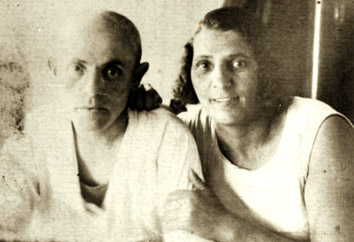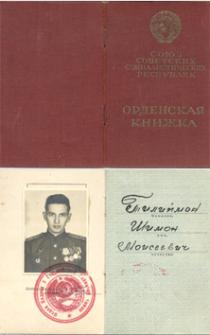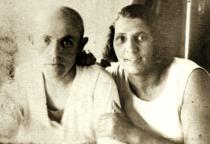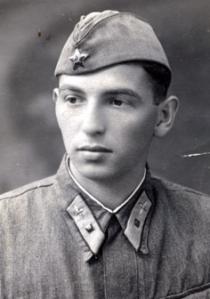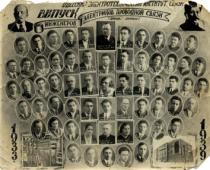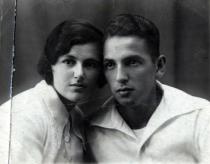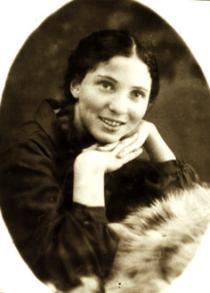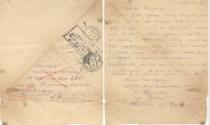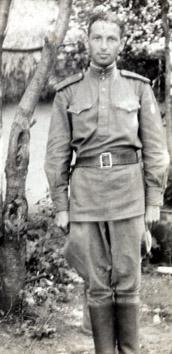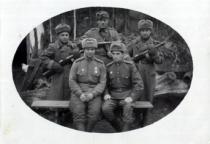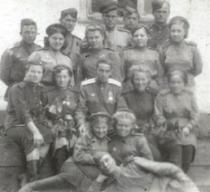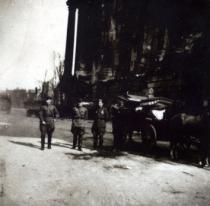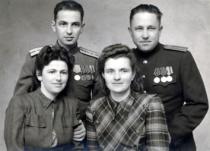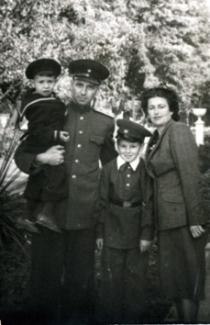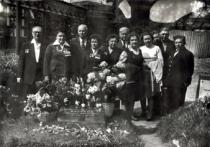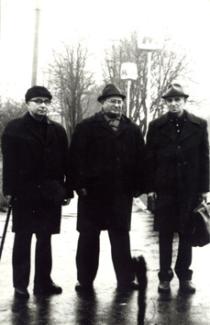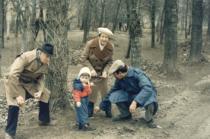These are my parents Moisey and Hana Tilipman. This photo was taken in Odessa in 1936.
My father Moisey Tilipman was born in Dzygovka town, Vinnitsa region some time in the 1890s. My father was raised religious. I think he studied in cheder. Father spoke Yiddish and prayed in Hebrew. He met my mother in the town when he was in his teens. My mother Hana Davidovich was born in Soroki in late 1890s. At the age of 14 she came to Dzygovka located on the opposite bank of the Dnestr River to study sewing. She met my father there. My father's parents were against their marriage. They were probably a wealthier family than my mother's. My parents moved to Odessa secretly in the late 1900s. They had a traditional Jewish wedding in Odessa. My grandfather didn't forgive my father. He didn't have any contacts with father. My parents never visited Dzygovka from what I remember.
My father loved my mother dearly and respected her. He believed and so do I that a woman is the head of a family. She needs to be cared for and get everything best. My mother was a Greek type: she had swarthy skin, big black eyes and thick hair. She was nice and kind like all mothers are. In 1911 my parents had their older son born. It seems they named him Boris. In 1913 another boy was born whose name I can't remember. I was born in 1916. In 1921 during the famine in Odessa my older brothers starved to death. They were buried on the same day at Jewish cemetery. In 1923 my brother Fima was born. In 1924 my sister Ghenia was born.
My mother didn't work. My father was a vendor at the Alexeevski market. He had a small booth shop at the market selling something. My parents were religious. On holidays they went to the synagogue on the corner of Staroportofrankovskaya and Novorybnaya Streets. I attended the synagogue with my parents when I was 10-12 years old, but I don't remember any details. I remember that my father liked listening to a good cantor. My parents spoke Yiddish and I could understand Yiddish well. They observed Sabbath. I remember my mother lighting candles. I don't know whether my father worked on Saturday. I just don't remember. My mother made gefilte fish and matzah dishes at Pesach: pudding and pancakes. My father and I liked goose fat cracklings. My mother put a bowl of cracklings on the table for us to 'satisfy our eyes' hunger'. I remember what she said: 'When you want to give someone food to eat to his heart's content give him a lot of food and his appetite would be half less'. I also remember Chanukkah and dreidel and we got Chanukkah gelt. My mother went to buy food at the Privoz: fish, poultry, vegetables and fruit. I also remember that mother bought live chickens and took them to a shochet.
My father had to fight to make his living. He was a vendor, but he didn't quite like it and in the 1920s he went to work as a binder at the 'Chernomorskaya Communa' publishing office. Since his salary was not enough to support the family, he additionally made elastic bands, leather wristlets and shoelaces. My father treated leather in the attic. My father was doing better at his work and decided to buy few dollars to keep them as savings. The person who sold these dollars to my father reported on him. He stayed in prison 24 hours. He never told us what they did to him there. NKVD employees convoyed him home and he showed them his hiding place. They took away my father's dollars.
I didn't have any information about my family from the beginning of the Great Patriotic War. I received the latest card from my father from Odessa in August 1941. I knew about German atrocities against Jews from newspapers and kept writing my father to leave Odessa. After Odessa was occupied I received a letter from my friend Akiva Averbuch's father in October 1941. He stayed with my parents for some time before he evacuated and also tried to convince my parents to evacuate. My younger brother Fima was in the army near Odessa and my parents couldn't leave the town without knowing what had happened to him. Shortly after Odessa was liberated in 1944 - I was at the front in Poland - I received a letter from my cousin brother Naum Davidovich. He returned to Odessa from evacuation. He wrote that my parents and sister perished in Domanevka camp for Jews in 1942 and my brother Fima perished during defense of Odessa in 1941.
